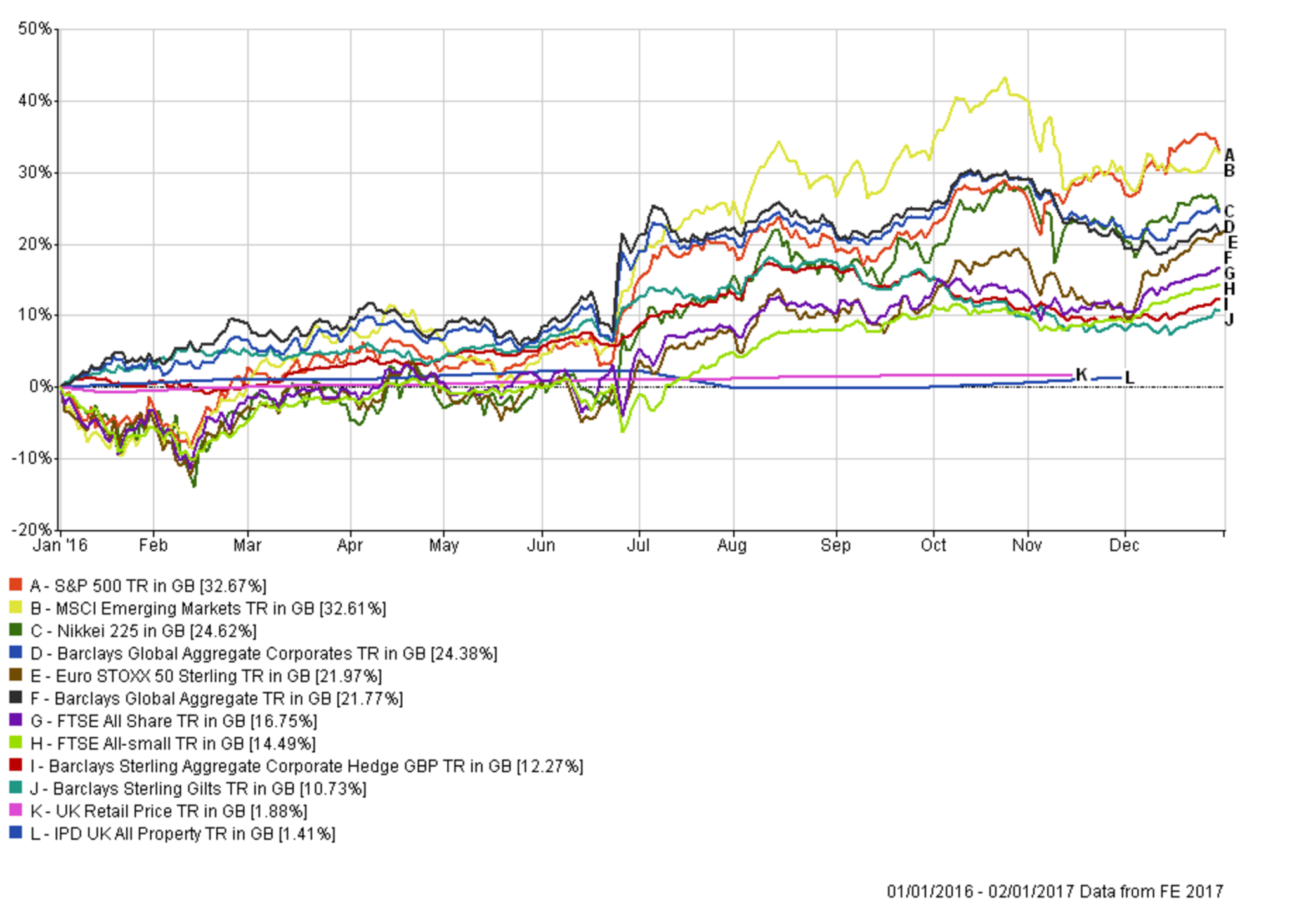When the now famous RBS analyst cried ‘sell everything’ in January 2016, it was apparent the intent was to grab attention. And grab attention it did. It was echoed by the financial press. Never mind that it was downright reckless for any investor to do so.
As it turns out, 2016 was a good year for mainstream asset classes. It was difficult not to have made money, even if you tried. Even gilts posted double digit returns again. Gilts!!!
[bctt tweet=”It was difficult not to have made money in 2016, even if you tried.” username=”AbrahamOnMoney”]
 Basically, everything made money in 2016.
Basically, everything made money in 2016.
Well, almost everything. If you’d invested in a South East Asian Forestry Fund or Sub-Saharan African Commodities you probably didn’t make any money, but what did you expect?
The good return on most major asset classes wasn’t for lack of volatility. It was because of it. The year was scary for many investors. Particularly those who paid close attention to the daily vagaries of the market as they were reported in the media. Several times during the year, the media reported that billions were ‘wiped off’ the stock market. But we heard nothing when those billions were ‘wiped back on’.
[bctt tweet=”The media reported that billions were ‘wiped off’ the stock market. But we heard nothing when those billions were ‘wiped back on.” username=”AbrahamOnMoney”]
The year started off with what the media dubbed ‘a global meltdown’; the Chinese equity market fell by 18% in the first 15 days of the year. It was so bad the Chinese authorities had to halt trading to stabilize the markets.
Then we had the Brexit vote in June. Everyone was wetting their pants about the subsequent closure of commercial property funds. Interestingly, most major asset classes recorded most of their gains in or after June 2016. This was partly due to a sharp decline in the value of the pound against the dollar and the euro. But it was hard to find anyone who had accurately predicted this market response.
And then came along the demagogue Trump, who won the US election contrary to the predictions of every credible pollster. In the run up to the election, one of the more respected financial journos, John Authers of the FT predicted that if Trump won…
First, there will be horror and a big sell-off, centred on US stocks and the dollar. (US treasury bonds, overvalued though they are, might counter-intuitively gain, thanks to their haven status). The Brookings Institution’s estimate that the fall could be between 10 and 15 per cent seems overdone. That would be the second biggest daily fall ever, and some risk of a Trump victory is now priced in. But it would be quite a day, particularly as Mr Trump tends to be viewed with unalloyed horror outside the US.
And how wrong he was. The weeks that followed Trump’s victory saw the Dow and the S&P 500 reach new highs.
So, what’s the moral of the story?
- Nobody knows shit! Not when it comes to predicting what equity or bond markets are likely to do next. It’s wiser to simply acknowledge that we have no clue what any asset class is going to do next.
- Pain is an inherent part of investing. Volatility isn’t risk, it’s a key source of return. If you were trying to avoid the pain that was predicted to follow the Brexit vote, you probably missed much of the gain.
- Diversification across major asset classes is by far the most effective insurance for most investors. It works, but it doesn’t work magic.
Want some investment ideas for 2017? Try these:
- Diversify your portfolios across global equities and global bonds based on the amount of volatility you can stomach. See brainless portfolios.
- Keep costs as low as you possibly can and rebalance once a year.
- Ignore your portfolio for the rest of year. Do something meaningful with your time. Play more golf, or watch paint dry if you like.
This is what I did when I constructed ‘brainless portfolios’ that trounced most portfolios constructed by the Masters of the Universe.
Follow these tips and you’ll likely beat 90% of professional investors who spend all their time guessing what the market will do next.
But I doubt you will. It’s too simple. In which case, I wish you the very best of luck with your investing in 2017! You’re going to need it.



